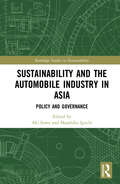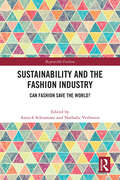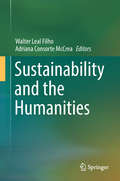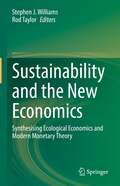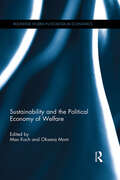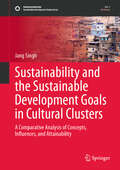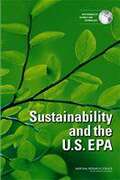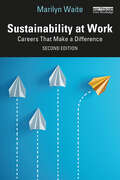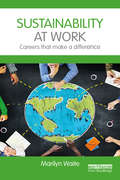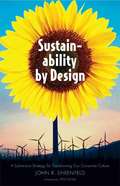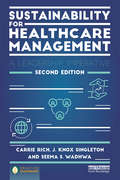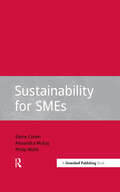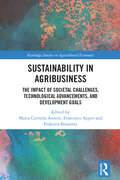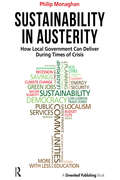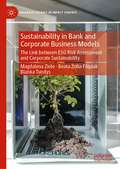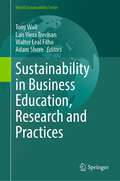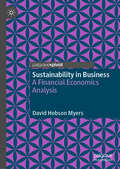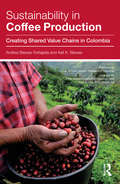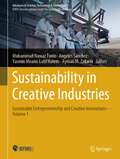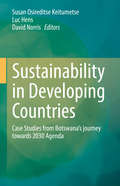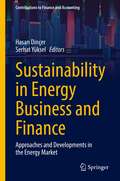- Table View
- List View
Sustainability and the Automobile Industry in Asia: Policy and Governance (Routledge Studies in Sustainability)
by Suwa Aki Iguchi MasahikoThis book provides a wealth of information and a critically required framework for sustainable automobile policy development in major Asian countries. It also gives wide-ranging policy options, ranging from technological to institutional solutions to automobile emission problems, based on empirical case studies and comparative policy and regulatory analysis. It is a useful reference with valuable insights on how rapidly changing economies are adopting their policy and regulatory structures to cope with the progressively severe environmental impacts of automobile increase.
Sustainability and the Fashion Industry: Can Fashion Save the World? (Responsible Fashion)
by Annick Schramme Nathalie VerbovenThere is widespread rhetorical agreement that the fashion industry must get itself onto a more ethical and sustainable footing. What does this mean in practice, and how can this be achieved in different regions around the world?This book brings together expert scholars and reflective practitioners via a network of dialogue and exchange to help drive forward an ethical and sustainable future for the fashion industry. With insights from fashion design, management, sociology, philosophy, education, heritage studies and policy, the book asks whether or not fashion can save the world.Enriched with illuminating case interviews and the perspective of experts, this book will be of interest to researchers and scholars in the fields of sustainable business and the fashion industry, and provides a unique resource for readers seeking to understand more about the need for responsible fashion.
Sustainability and the Humanities
by Walter Leal Filho Adriana Consorte McCreaThis book explores the strong links between sustainability and the humanities, which go beyond the inclusion of social sciences in discussions on sustainability, and offers a holistic discussion on the intellectual and moral aspects of sustainable development. The contributions from researchers in the fields of education, social sciences, religion, humanities, and sustainable development fulfill three main aims:They provide university lecturers interested in humanities and sustainable development with an opportunity to present their work;foster the exchange of information, ideas and experiences acquired in the execution of teaching and research; anddiscuss methodological approaches and projects that provide a better understanding of how the humanities can contribute to the debate on sustainable development. Prepared by the Inter-University Sustainable Development Research Programme and the World Sustainable Development Research and Transfer Centre, the book reiterates the need to promote integrated approaches to sustainable development. Including practice-based lessons learnt that can be replicated further, it is a valuable resource for scientists and practitioners working in the humanities and sustainable development.
Sustainability and the New Economics: Synthesising Ecological Economics and Modern Monetary Theory
by Rod Taylor Stephen J. WilliamsThis multidisciplinary book provides new insights and hope for sustainable prosperity given recent developments in economics – but only if swift and strong actions consistent with Earth’s biophysical limits and principles of justice are universally taken. It is one thing to put limits on resource throughput and waste generation to conform with the ecosphere’s biocapacity. It is another thing to efficiently allocate a sustainable rate of resource throughput and ensure it is equitably distributed in the form of final goods and services. While the separate but interdependent decisions regarding throughput, distribution, and allocation are the essence of ecological economics, dealing with them in a world that needs to cure its growth addiction requires a realistic understanding of macroeconomics and the fiscal capacity of currency-issuing central governments. Sustainable prosperity demands that we harness this understanding to carefully regulate the rate of resource throughput and manipulate macroeconomic outcomes to facilitate human flourishing. The book begins by outlining humanity’s current predicament of gross ecological overshoot and laments the half-century of missed opportunities since The Limits to Growth (1972). What was once economic growth has become, in many high-income countries, uneconomic growth (additional costs exceeding additional benefits), which is no longer advancing wellbeing. Meanwhile, low-income nations need a dose of efficient and equitable growth to escape poverty while protecting their environments and the global commons. The book argues for a synthesis of our increasing knowledge of the ecosphere’s limited carrying capacity and the power of governments to harness, transform, and distribute resources for the common good. Central to this synthesis must be a correct understanding of the difference between financial constraints and real resource constraints. While the latter apply to everyone, the former do not apply to currency-issuing central governments, which have much more capacity for corrective action than mainstream thinking perceives. The book joins the growing chorus of authoritative voices calling for a complete overhaul of the dominant economic system. We conclude with policy recommendations based on a new economics that, if implemented, would come close to guaranteeing a sustainable and prosperous future. Upon reading this book, at least one thing should be crystal clear: business as usual is not a viable option.
Sustainability and the Political Economy of Welfare: Perspectives, Policies And Emerging Practices (Routledge Studies in Ecological Economics)
by Max Koch Oksana MontWelfare is commonly conceptualized in socio-economic terms of equity, highlighting distributive issues within growing economies. While GDP, income growth and rising material standards of living are normally not questioned as priorities in welfare theories and policy making, there is growing evidence that Western welfare standards are not generalizable to the rest of the planet if environmental concerns, such as resource depletion or climate change, are considered. Sustainability and the Political Economy of Welfare raises the issue of what is required to make welfare societies ecologically sustainable. Consisting of three parts, this book regards the current financial, economic and political crisis in welfare state institutions and addresses methodological, theoretical and wider conceptual issues in integrating sustainability. Furthermore, this text is concerned with the main institutional obstacles to the achievement of sustainable welfare and wellbeing, and how these may feasibly be overcome. How can researchers assist policymakers in promoting synergy between economic, social and environmental policies conducive to globally sustainable welfare systems? Co-authored by a variety of cross-disciplinary contributors, a diversity of research perspectives and methods is reflected in a unique mixture of conceptual chapters, historical analysis of different societal sectors, and case studies of several EU countries, China and the US. This book is well suited for those who are interested in and study welfare, ecological economics and political economy.
Sustainability and the Sustainable Development Goals in Cultural Clusters: A Comparative Analysis of Concepts, Influences, and Attainability (Sustainable Development Goals Series)
by Jang SinghThis book examines the three pillars of sustainability (physical environment, social issues, and economic justice) and the progress and achievability of the United Nations’ (UN) 17 Sustainable Development Goals (SDGs) in Canada, Guyana, India, Sri Lanka, and the USA. It presents data from interviews with 41 political and business leaders in these five countries to examine the political and professional effects on sustainability. In addition to the three pillars of sustainability, the author briefly examines the role of religion in sustainability as a potential fourth pillar. The UN SDGs represent minimum targets for the global environmental, economic, and social pillars that underpin a sustainable future for our planet. The data presented in this book combined with the themes uncovered with the SDGs adds to our understanding of how we can potentially influence and achieve these targets and create a sustainable future for the world.
Sustainability and the U.S. EPA
by Committee on Incorporating Sustainability in the U.S. Environmental Protection AgencySustainability is based on a simple and long-recognized factual premise: Everything that humans require for their survival and well-being depends, directly or indirectly, on the natural environment. The environment provides the air we breathe, the water we drink, and the food we eat. Recognizing the importance of sustainability to its work, the U. S. Environmental Protection Agency (EPA) has been working to create programs and applications in a variety of areas to better incorporate sustainability into decision-making at the agency. To further strengthen the scientific basis for sustainability as it applies to human health and environmental protection, the EPA asked the National Research Council (NRC) to provide a framework for incorporating sustainability into the EPA's principles and decision-making. This framework, Sustainability and the U. S. EPA, provides recommendations for a sustainability approach that both incorporates and goes beyond an approach based on assessing and managing the risks posed by pollutants that has largely shaped environmental policy since the 1980s. Although risk-based methods have led to many successes and remain important tools, the report concludes that they are not adequate to address many of the complex problems that put current and future generations at risk, such as depletion of natural resources, climate change, and loss of biodiversity. Moreover, sophisticated tools are increasingly available to address cross-cutting, complex, and challenging issues that go beyond risk management. The report recommends that EPA formally adopt as its sustainability paradigm the widely used three pillars approach, which means considering the environmental, social, and economic impacts of an action or decision. Health should be expressly included in the social pillar. EPA should also articulate its vision for sustainability and develop a set of sustainability principles that would underlie all agency policies and programs.
Sustainability at IKEA Group
by V. Kasturi Rangan Vincent Dessain Jerome Lenhardt Michael W. ToffelBy 2014, IKEA Group was the largest home furnishing company, with EUR28.5 billion of sales, and planned to reach EUR50 billion by 2020, mainly from emerging markets. At the same time, IKEA Group had adopted in 2012 a new sustainability strategy that focused the company's efforts on its entire value chain from its raw materials sourcing to the lifestyle of its end consumers. The plan especially centered on wood, which represented 60% of IKEA Group's total procurement in volume and constituted a key lever for the company to increase its positive impact on sustainability. IKEA Group Management therefore had to decide how to manage its portfolio of wood sustainability initiatives, especially in the context of the company's aggressive growth plan.
Sustainability at Millipore
by Katharine Lee Michael W. ToffelThis case describes Millipore Corporation's approach to becoming a more environmentally sustainable company. As he prepared for his quarterly meeting with the CEO, the Director of Sustainability needed to develop positions on several issues. Tactically, he needed to recommend whether the company should purchase carbon offsets to help meet its aggressive greenhouse gas reduction targets, and whether to continue publicly reporting its greenhouse gas emissions and strategies despite recent problems. On a more strategic level, he needed to recommend how to take the company's Sustainability Initiative to the next level and consider whether changes were needed to its organizational structure. Finally, he needed to develop a more systematic approach to prioritizing investments in various projects being proposed to improve environmental performance.
Sustainability at Siemens
by Amy C. Edmondson Emer Moloney Daniela Beyersdorfer V. Kasturi RanganDescribes sustainability efforts at Siemens since arrival of Chief Sustainability Officer, Barbara Kux, in 2008. Asks students to evaluate success of those efforts and outline what the company should do going forward.
Sustainability at Work: Careers That Make a Difference
by Marilyn WaiteSustainability at Work is a compelling guide for anyone who seeks both a successful career and a career that makes a positive difference in society.Containing career advice of great value to students and professionals, and explaining how one can integrate sustainability into future roles, this book’s appeal extends far beyond those well versed in sustainability thinking. The text includes an easy-to-follow structure—the SURF Framework—that anyone wondering how they can make a difference in the workplace can apply. In this thoroughly revised new edition, Marilyn Waite builds upon recent career trends to include two all-important themes that are redefining sustainability: justice, equity, diversity, and inclusion and climate-related career pathways. In addition, practical advice for finding and creating roles that correspond to one’s preferences and purpose is elaborated. The book explains how real people in a plethora of sectors can have a positive impact on people and planet. Professionals from a variety of backgrounds and locations explain how they brought a sustainability approach to various sectors, including agriculture, business, economics, and financial services, education and research, entertainment and media, health care, law and policy, and science and technology. The breadth of stories covers individuals working on five continents in various levels of responsibility.Through inspiring narratives and a structured framework, Sustainability at Work illustrates how sustainability can be incorporated into every imaginable career to impact the quadruple bottom line: environment, economy, society, and future generations.
Sustainability at Work: Careers that make a difference
by Marilyn WaiteSustainability at Work is a compelling guide for everyone who wants to have both a successful career and a career that makes a positive difference in society. Containing career advice of great value to students of sustainability, and explaining how they can apply their knowledge to their future careers, its appeal extends well beyond the classroom. Sustainability at Work includes an easy-to-follow framework that anyone wondering how they can make a sustainable difference in the workplace can apply. Professionals from a variety of backgrounds and territories explain how they brought a sustainability approach to various sectors: agriculture, health care, business, economics, and financial services, education and research, law and policy, science and technology, and entertainment and media. Through inspiring narratives and a structured framework, Sustainability at Work illustrates how sustainability can be incorporated into every imaginable career to impact the quadruple bottom line: environment, economy, society, and future generations.
Sustainability by Design: A Subversive Strategy for Transforming Our Consumer Culture
by John R. EhrenfeldJohn Ehrenfeld challenges conventional understandings of solving environmental problems and offers a radical set of strategies to attain sustainability.
Sustainability for Healthcare Management: A Leadership Imperative
by Carrie R. Rich J. Knox Singleton Seema S. WadhwaSustainability is not unique to health, yet sustainability is a unique vehicle for promoting healthy values. This book challenges healthcare leaders to think through the implications of our decisions from fiscal, societal and environmental perspectives. It links health values with sustainability drivers in order to enlighten leadership about the value of sustainability as we move toward a new paradigm of health. Fully updated for the second edition, the book now includes case studies about: Waste disposal and cost Chemicals of concern Cost of water Green building ratings This book is a unique resource for researchers, students and professionals working in health and healthcare management because the book connects key concepts of environmental sustainability with healthcare operations. Readers will gain an appreciation for translating leadership priorities into sustainability tactics with beneficial operational outcomes.
Sustainability for SMEs: Competitive Advantage Through Transparency (Doshorts Ser.)
by Philip Wolfe Elaine Cohen Alexandra McKaySustainability for SMEs offers a comprehensive introduction to the key business cases and techniques for putting sustainability at the heart of your business strategy.Small businesses make a significant collective impact on the environment and society – but only a tiny percentage of SMEs complete a sustainability report. Sustainability Reporting for SMEs will enable any SME to get up to speed on sustainability reporting and plot a course of action for their business. Elaine Cohen distils the latest and best thinking on sustainability reporting for SMEs, and offers a process for reporting that will deliver significant business advantage, both in terms of more effective internal processes and in terms of reputation, customer loyalty and business-building.In many SMEs sustainability is one person’s passion and responsibility. A large part of their job becomes selling sustainability to other people in the business. Strategic Sustainability offers arguments, information and tactics that will help that person get the buy-in they need to move sustainability forward in their business. Sustainability is of strategic importance to a business. This book makes an airtight case for why action is essential and how sustainability can help a business not only survive but thrive in competitive marketplaces.The major environmental impact of most businesses derives from energy usage. There are many ways to make your organisation's energy usage more sustainable. In Sustainable Energy Options for Business, Philip Wolfe outlines the best available options for (1) reducing energy use and (2) improving the sustainability of energy supply. After an introduction to regulatory drivers and management issues, Wolfe looks at energy opportunities in five key areas.
Sustainability for a Warming Planet
by Humberto Llavador Joaquim Silvestre John E. RoemerHuman-generated greenhouse gas emissions imperil a global resource: a biosphere capable of supporting life as we know it. What is the fair way to share this scarce resource across present and future generations, and across regions of the world? This study offers a new perspective based on the guiding ethics of sustainability and egalitarianism.<P><P> Sustainability is understood as a pattern of economic activity over time that sustains a given rate of growth of human welfare indefinitely. To achieve this, the atmospheric concentration of carbon must be capped at some level not much higher than exists today, and investments in education and research should be higher than they currently are. International cooperation between developing and developed nations is also vital, because economic growth and the climate problem are intertwined.<P> The authors propose that the guiding principle of bargaining should be that the dates at which developing countries' living standards catch up with those of developed countries should not be altered by the agreement. They conclude that developed economies would have to agree not to exceed 1 percent growth in per capita GDP annually, while developing nations should grow at a faster rate, but still lower than current projections, until they converge. The authors acknowledge that achieving such a dramatic slowdown would carry political and economic challenges.
Sustainability in Agribusiness: The Impact of Societal Challenges, Technological Advancements, and Development Goals (Routledge Studies in Agricultural Economics)
by Maria Carmela Annosi Federica Brunetta Francesco Paolo AppioAccomplishing sustainability in the agribusiness sector is a significant, yet time-sensitive, challenge, especially when balanced with the need to grow sufficient quantity and quality of food to keep the growing global population healthy. Through both quantitative and qualitative methods, this book explores the extent to which the agribusiness sector is already evolving to become sustainable and the ways in which innovation in the industry can help address sustainable development goals, particularly around zero hunger, gender equality, decent work, responsible consumption and production, and climate action. The contributors to this volume address the following key questions: What are the drivers and barriers for the agribusiness sector to become sustainable? Which business models best facilitate the implementation of sustainable goals? How can we measure the extent to which the agribusiness sector is becoming more sustainable? How can the agribusiness sector leverage recent technological advancements to achieve its sustainability goals? The analysis of the sustainability challenges for the sector ranges across various facets of the industry including employment, pre-production industries, agriculture, food processing, distribution, and trade. This book will be of significant interest to readers in agribusiness, innovation management, and sustainability.
Sustainability in Austerity: How Local Government Can Deliver During Times of Crisis
by Philip MonaghanAs the economic crisis of 2008/09 unfolded, it became apparent that the huge mountains of debt being built up by central governments were unsustainable and that savage cuts would be needed to balance budgets. It also became clear that the public sector would be one of the first in line when the axe started swinging. Yet, at the very same time, green advocates from business, academia and civil society were making calls for greater investment at the local level in the big sustainability issues of the day such as fostering sustainable consumption or educating communities on making the transition to a low-carbon economy. The upshot is that leaders in local government are going to be asked to do a lot more work on environmental and social sustainability but with much less money. To make matters worse, increasing public scepticism about why we should deal with these dilemmas in the first place has been exacerbating the problem, notably exemplified by concerns over the robustness of the science of climate change. Local sustainability faces a perfect storm. Sustainability in Austerity has been written to provide local leaders with a lifebelt in these turbulent times. It empowers local authorities to address the challenges they now face – by offering a treasure chest of cost-neutral and powerful ways for leaders in local government to advance sustainability as nations emerge from the global recession. The book sets out the required rules for leadership and proposes a myriad of innovative strategies for self-help achieved through habit-forming behaviour change among council members, staff and local communities alike. Packed with international case studies, anecdotes and management tips derived from a wealth of learning by like-minded peers across the world – all of whom have faced and overcome serious sustainability challenges – the book will be a touchstone for professionals working in areas such as: democracy and decision-making; corporate assets and resources; economic development and planning; waste and environmental services; fleet and logistics; and community management. There is an impressive array of books that provide fresh and innovative thinking on sustainability, but the vast majority have ignored or overlooked inspirational stories of positive change in local government. Sustainability in Austerity is a game-changing book and will be essential reading for managers and councillors in local government across the world, in either emerging or developed economies; managers in central government; community organisation leaders; academics; and management consultants who work with this sector on policy and performance.
Sustainability in Bank and Corporate Business Models: The Link between ESG Risk Assessment and Corporate Sustainability (Palgrave Studies in Impact Finance)
by Magdalena Ziolo Blanka Tundys Beata Zofia FilipiakThe book explains the impact of bank business models on company business models by discussing the relationship among banks decision-making processes, sustainable values creation in company business models, and ESG risk. The monograph provides a combination of financial and management-related activities, in the context of bank business models, taking into account the concept of sustainability, and will be of particular interest to both in-house practitioners, giving them innovative knowledge about the models presented and used, and to students and young researchers.
Sustainability in Business Education, Research and Practices (World Sustainability Series)
by Walter Leal Filho Tony Wall Laís Viera Trevisan Adam ShoreThe connections between sustainability and business education are becoming increasingly important due to the growing recognition of environmental and social challenges, as well as the role that businesses play in addressing these challenges. Businesses have a significant impact on the environment, society, and the economy. Issues such as climate change, resource depletion, social inequality, and ethical concerns directly affect business operations and performance. Business education needs to equip future leaders with the knowledge and skills to navigate these challenges responsibly. This book provides a platform for the dissemination of information on the latest initiatives and practices in these areas, and promotes future cooperation between universities and business schools across the globe.
Sustainability in Business: A Financial Economics Analysis
by David Hobson MyersThis book provides an approach to sustainable decision-making rooted in financial and economic literature. Financial economic techniques have the power to frame the discussion of sustainability to explain who, how, and why sustainability is a growing phenomenon in business and investing. Financial concepts in a sustainable framework provide a theoretical basis to approach research and business questions on sustainability. The framework provides for a better understanding of the different definitions of sustainability and the role those differences have on decisions that will lead to the future of sustainable business. A future which relies on growth driven by expanding its markets’ reach (demographics), its innovation or creation of new products, and its capital structure (leverage). Third party certification and governmental regulation become the constraints on that growth as well as the proof of sustainable growth. Finally, the ability and methods for investors to support sustainable growth is addressed in a modern portfolio theory analysis.
Sustainability in Coffee Production: Creating Shared Value Chains in Colombia
by Asit K. Biswas Andrea Biswas-TortajadaCoffee, as a commodity and through its global value chains, is the focus of much interest to achieve fair trade and equitable outcomes for producers, processors and consumers. It has iconic cultural and economic significance for Colombia, which is one of the world's major coffee producers for the global market. This book examines sustainable coffee production in Colombia, specifically the initiatives of Nestlé to create shared value. It describes the transformation of the coffee landscape by the development of economically, socially and environmentally viable and dedicated supply chains. Suppliers have been encouraged to shift production and quality paradigms, in order to develop long-term and sustainable strategies for higher value and premium quality products. This has been partially achieved by establishing a robust partnership with the Coffee Growers Federation and other public, private and social actors, thereby taking control of the institutional architecture and knowledge base that exists in the country. The book provides an important lesson of corporate social responsibility and the creation of shared value for the benefit of farmers, corporations and consumers.
Sustainability in Creative Industries: Sustainable Entrepreneurship and Creative Innovations—Volume 1 (Advances in Science, Technology & Innovation)
by Muhammad Nawaz Tunio Angeles Sánchez Yasmin Moanis Latif Hatem Ayman M. ZakariaThis book discusses a compelling array of topics at the intersection of entrepreneurship, education, and technological innovation within the creative industries. It delves into a captivating exploration of sustainable entrepreneurship in Part 1, where key characteristics of sustainable entrepreneurs and factors influencing entrepreneurial intention are dissected. By unearthing the nexus between entrepreneurial alertness, networking capability, and venture performance, it provides intriguing insights into sustaining traditional crafts and brands amid the COVID-19 pandemic. The following parts not only unveil current innovative pedagogical strategies in creative design education but propels you into the future, exploring the harmonious fusion of academia and industry in sustainability-driven programs. Designed for educators, students, researchers, and practitioners in entrepreneurship, design, and technology fields, this book offers a transformative journey into sustainable practices, innovative pedagogies, and cutting-edge advancements. Engaging, informative, and thought-provoking, it is a must-read for those seeking to shape the future of creative industries through entrepreneurship, education, and innovation.
Sustainability in Developing Countries: Case Studies from Botswana’s journey towards 2030 Agenda
by Susan Osireditse Keitumetse David Norris Luc HensThis book illustrates an alternative approach to ‘state of sustainability’ reporting by presenting cross-sectoral and multi-disciplinary discussions on sustainability issues in the context of a developing country, Botswana. The book volume illustrates how academic publishing can supplement African governments' existing forms of reporting on sustainability by providing on-ground detailed descriptions and experiences relating to achievement of the various sustainable development goals (SDGs). In addition, this process involves, increases and enhances diversity of stakeholders that report on sustainability. Furthermore, the approach resonates with the UN’s recommendation to build local strategies for implementation of the 2030 agenda for sustainable development. Conventional reporting on sustainability by most African countries is an exercise that is customarily the preserve of designated government ministries. While this form of reporting provides a consistent platform for tracking sustainable development goals, it can also benefit from juxtaposition with in-depth descriptions and experiences provided by academic publishing. Academia, through publishing, provides a framework for on-ground situation-analysis as well as in-depth descriptions of African country’s grass-root experiences, thus allowing for temporal tracking of sustainable development milestones. As this volume illustrates, experiences from the various contributors on this volume highlight different points of departure towards achieving the 2030 agenda. Topics covered include biodiversity, water management, world heritage, environment, education, tourism, gender, institutional approaches to achievement of SDGs, as well as contribution of non-governmental organisations (NGO)'s amongst others.
Sustainability in Energy Business and Finance: Approaches and Developments in the Energy Market (Contributions to Finance and Accounting)
by Hasan Dinçer Serhat YükselThis edited volume seeks to identify the sustainability issues currently affecting the energy business and finance. For this purpose, a broad range of perspectives on sustainability issues in the energy business and finance are taken into consideration in the context of renewable business projects. In turn, several novel strategies from the energy business and finance are illustrated with regard to sustainable organizational factors, technological infrastructure, financial facilities, economic development, and investment potential. Comparing and contrasting different sustainability perspectives can help to develop the most appropriate and successful business strategies for the sustainable energy business and finance. This book presents multidimensional analyses of sustainability issues with regard to renewable energy projects and identifies the most promising strategies, as well as efficient market conditions for the energy business.
